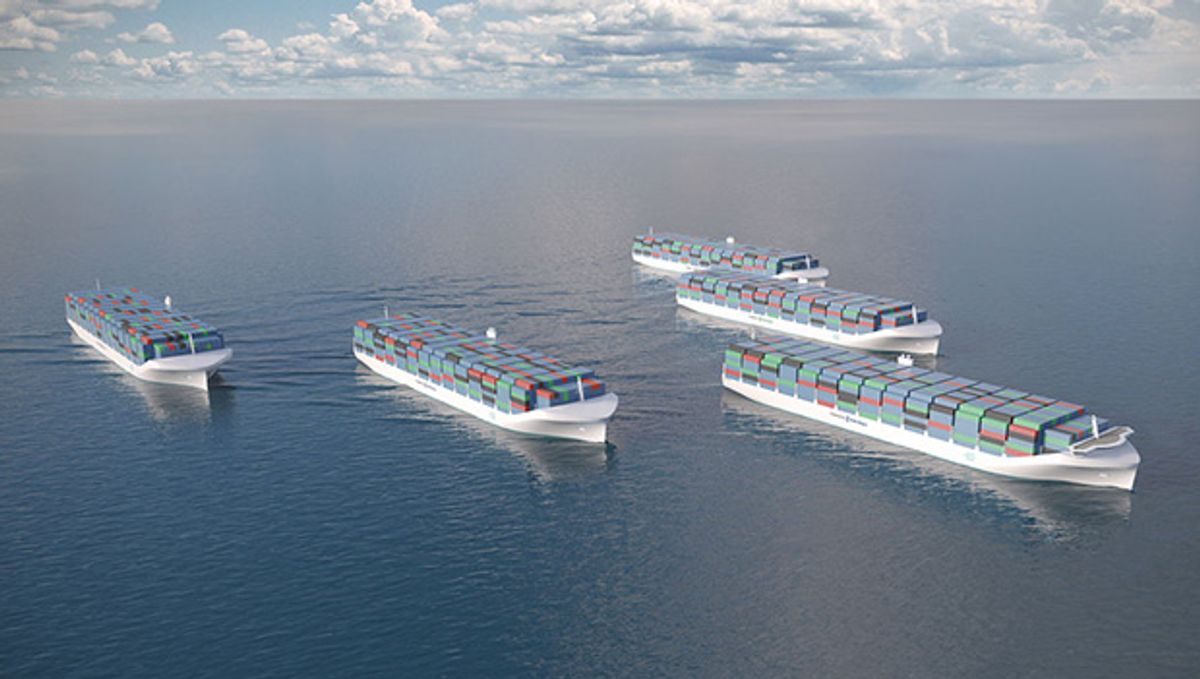British engineering company Rolls-Royce has been working on hardware and software systems designed to turn the giant cargo ships that are responsible for 90 percent of intercontinental world trade into semi or fully autonomous robots. The company says that these drone ships would be safer and more efficient than manned ships, but the shipping industry isn't buying it.
Rolls-Royce’s Blue Ocean development team, which is leading the project, says that taking humans off of ships (and removing all of the human-related infrastructure, like crew quarters, heating and air conditioning, water purification and storage, etc.) would lead to ships that weigh 5 percent less and would use up to 15 percent less fuel. Additionally, the average cargo ship costs between US $3,000 and $4,000 per day in crew operating expenses alone.
To keep humans in the loop somewhere, Rolls-Royce is also creating on a prototype virtual reality display system that gives a captain (or whatever you call someone in charge of a ship when they're not actually on said ship) 360-degree views from a virtual bridge. The captain can hop from virtual bridge to virtual bridge, theoretically overseeing many different ships all at once through remote supervised autonomy.
While unmanned cargo ships are currently illegal, Rolls-Royce is optimistic that "the technology is at the level where we can make this happen, and society is moving in this direction."
Image: Rolls-Royce
Unfortunately, making this happen is not going to be easy. It's not because the technology isn't there, but rather because humans have been in control of ships for so long that there's a lot of resistance to changing that, mostly surrounding what seems to be an implicit belief that it's just not something that's realistically possible to execute safely.
Unmanned ships should be considered in the same terms as we consider unmanned cars and other unmanned systems. This is a big "should," because it's not the way it works in practice, but still: what we should be asking is not how safe we can make an unmanned ship, but whether we can make an unmanned ship as safe or safer than a manned one. If we can cross that threshold, then we should be willing to go the unmanned route, especially if there are significant additional benefits. And considering that (as with just about everything) human error causes most maritime accidents, there's potential to make sea travel much safer than it is today.
Humans, strictly speaking, are absolutely awful at things like driving cars and steering ships for long periods of time, because it's boring, we're lazy, and sooner or later we get tired and stop paying attention. We just have to get over the knee-jerk reaction that humans can do a better job at it than an autonomous system. As one maritime standards association member put it, "Can you imagine what it would be like with an unmanned vessel with cargo on board trading on the open seas? You get in enough trouble with crew on board."
Er, yeah, that's kind of the point, isn't it? Humans cause trouble. Computers don't. Or at least, when they cause trouble, they do so in ways that are often predictable, and if they do manage to screw up, other computers can stop them before anything really bad happens. If all else fails, and something really bad does happen, you can go back and figure out exactly why it happened and prevent it from happening again. That's one of the advantages of technology, but not everyone agrees:
“It cannot and will never replace the eyes, ears, and thought processes of professional seafarers,” Dave Heindel, chairman of the ITF’s seafarers’ section in London, said in [a statement emailed to Bloomberg]. “The human element is one of the first lines of defense in the event of machinery failure and the kind of unexpected and sudden changes of conditions in which the world’s seas specialize. The dangers posed to the environment by unmanned vessels are too easily imagined.”
Now, I'm not a sailor, and people who know more about this sort of thing than I do should feel free to correct me on this, but I have to imagine that the world's seas offer conditions that are no more complex, and potentially far less complex, than the conditions that you'd find driving around downtown San Francisco during rush hour. Furthermore, we already know that sensors (like radar) are better than humans at detecting other ships and obstacles in the water, especially in the dark or in bad weather.
There's an obvious path forward from here: do what Google did with its autonomous car program. Make the ships autonomous, but keep a human behind the wheel until we've built up some confidence in the technology. Perhaps we gradually decrease the dependence on crew, and increase opportunities for teleoperation. And maybe it'll never make sense to completely remove humans from ship operations, but significantly reducing the crew to improve both safety and efficiency at the same time certainly sounds like a good idea to me.
Via [ Bloomberg ]
Evan Ackerman is a senior editor at IEEE Spectrum. Since 2007, he has written over 6,000 articles on robotics and technology. He has a degree in Martian geology and is excellent at playing bagpipes.




